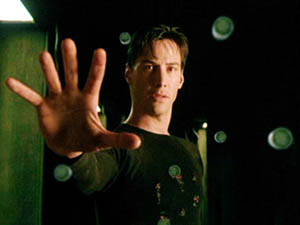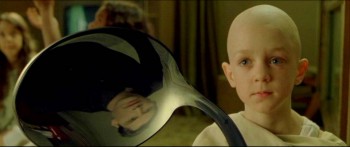|
What's all the hubbub, bub? When this film came out, it was hailed as little short of the second coming of Mrs. Jesus H. Mohammed. I scratched my head with slight puzzlement. "This movie," I'm pretty sure I asked, "has Keanu Reeves in it, correct? That cannot bode well." The high breaker it continued to ride left me confused, as well. Did this film really deserve to beat The Phantom Menace for the Best Effects Oscar? The answer is "no, it didn't." Like it better than Phantom if you wish, but don't try to say that it had more ground-breaking effects work, because that is factually untrue. The Matrix did one new thing, the now eye-liquifyingly overused "bullet-time" technique, which wasn't even actually new when the film came out; it had appeared in commercials prior to then. In fact, though I'm not sure who influenced who, I can't help but notice that almost the entire film is photographed like an extended car commercial. With shooting.  So after it hit home video, I did finally get around to seeing the film, and found it somewhat underwhelming. This is not to say I didn't enjoy it as much as the average action flick, but it didn't reinvent my moviegoing experience like Star Wars had, or the way The Lord of the Rings shortly would. In fact, it seemed like little more than an expensive version of all those virtual-reality flicks that came out in the early '90s. It was in fact written a good while before it finally got made-the Wachowski brothers had to make the low-budget (and altogether better) flick Bound first, just to prove they could actually make a movie before anyone would shell out all the necessary cash for this one. It shows, too: the fact that Mr. Anderson has an "alternate life" wherein he Gasp! goes on-line under a screen name is treated as a somehow distinguishing and even somewhat subversive bit of behavior. At any rate, we all know what happens. "Neo" finds out that he's really living in an enormously complicated computer simulation, and gets yanked out by resistance fighters who want him to help them destroy the computer program that actually makes life bearable, "because it's not real." The first part of the film, before Neo realizes just what downslide he's up for, is the best part. It's not spooky or creepy enough, but dangles the promise of a fascinating ride in front of us. What we actually get is a middle act that's almost entirely exposition, and a third act that's almost entirely B-grade kung-fu shot in slow motion. This structure makes repeat viewings really dull in the middle; the expository bits would've been served much better if Neo had had to learn as he went while actually dealing with surviving the Matrix. And the action bits would've been better served if they'd not had to introduce the world at large to the questionable thrill of freezing the action, moving the camera someplace else, and then letting it start again, in order to indicate...something. I've rarely seen bullet-time utilised in a way that it seemed to connote anything at all beyond a desire to be trendy, the way every post-Terminator 2 action flick had to squeeze in morphing to indicate same. I don't know how Keanu Reeves ever became a box-office draw; he really can't act, but while this film is no exception, it at least has him playing a character who's a rather boring guy. Lawrence Fishburne can act, but you wouldn't know it from his decision to deliver all of his lines in a voice best suited to telling campfire ghost stories. The fact that almost all of his dialogue is oblique and pretentious doesn't help..."Welcome to the desert of the real" invariably leaves me screaming "the real WHAT?" Carrie-Anne Moss proved with Memento that she could act, but like Reeves, she's not really required to here. Trinity has no real personality, unless wearing black and kicking ass count as a personality these days. Hugo Weaving and Joe Pantoliano can act, which underscores a fundamental problem with the film. Weaving's Agent Smith, a computer program given human form, logically wouldn't even need a personality, and yet manages to be far more interesting than the cardboard finger-puppet hero. Pantoliano's Cypher is the only particularly interesting member of the resistance, and the only one who even bothers to raise the question "what the hell is wrong with the Matrix, anyway?" So naturally, he's also a backstabbing traitor, because the key enemy of progress is questions. So frankly, I end up being more interested in the bad guys. The heroes just aren't compelling. It doesn't help that they aren't particularly heroic, either. The dismissive bit of explanation wherein Fishburne's Morpheus tells Neo that the people still within the Matrix are still part of the system that they're fighting, unaware of it that they might be, doesn't change the fact that Neo and Trinity remorselessly slaughter dozens of innocent people trying to rescue their leader. We're obviously supposed to think it's way cool when Neo walks into a building carrying enough gats to obliterate the entire Middle East, when all I'm thinking is "Shit, don't these cops have families?" It's frequent, of course, in the journey of a hero to come face-to-face with having to do something terrible for a potentially greater good, but those are the moments that classical heroes agonize over, instead of simply worrying over having to find as many places as possible to strap on a gun. 
Almost more than the film itself, though, I find seriously aggravating the hordes of moviegoers who seem to consider this a thinking man's film, when it's just an average cyberpunk story with some martial arts added in. The Matrix may include discussion of many highbrow topics, but it manages to get all of them wrong in one way or another. The comprehension of physics here would earn them a flunking grade. A giant computer is powered by human bio-energy? So what powers the human bodies; the computer? Can anyone shout "perpetual-motion machine" from the top floor of the Sears Tower? How about that biology? Humans are apparently classified by Agent Smith as viruses due to their behavior, instead of by their goddamn genetic code, the way actual scientists determine species type. Not to mention that animals other than man do not all naturally fall into harmony with their enviornment, as he suggests; plagues of locusts couldn't give a winged rat's ass what they do to the enviornment, any more than tree-felling, river damming beavers or rampant rabbit populations in Australia do. And to the subsequently popularized question of "How do we know the world isn't all an artificial construct?" I can only answer with a heartfelt "Who gives a shit?" There is no practical differentiation between a thing and an indistinguishable emulation of that thing. This is tantamount to asking "What if someone invisibly sneaked into your house while you were out and replaced all your furniture with exact duplicates?" WHO? CARES? No one in the film who isn't evil even bothers to consider this issue, simply brushing aside the matter with the argument "the matrix isn't real" which is a preposterous statement akin to "the internet isn't real," or, since the matrix gives false information, "the Fox News Network isn't real." Of course, if one stops to consider it long enough, one may well wonder why the computers even bothered to create a computer simulation to entertain the human race in the first place. If it's needed to stimulate brain activity, why not just use easily-amused animals, which wouldn't require the expenditure of nearly as much rendering and programming power, and wouldn't try to escape or foment insurrection? For my money, the human race should be grateful their enemies threw them such a generous bone; most conquerors don't tend to bother. This is the problem that occurs when lowbrow movies hold themselves up as thought-provoking: the thoughts they actually provoke end up spoiling the whole thing. The Matrix reminds me of the time I was almost squashed by a big gasoline tanker; it gave me something to talk about, and I don't regret it happening, but once for this lifetime was enough. -review by Matt Murray
|
|
||||||||